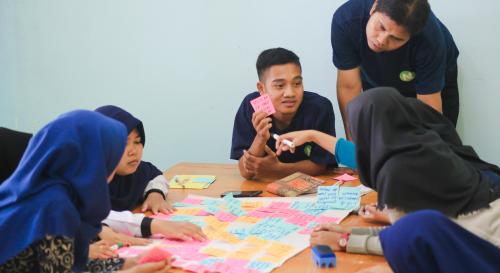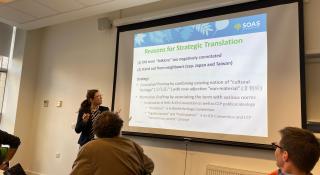Breadcrumbs navigation
Methods Summer School - Knowledge, inspiration, and practical tools for development
BISA partnered with The Department of Politics and International Relations at the University of Southampton to launch their first Methods Summer School. Some students were provided with BISA bursaries to attend, including Michael Mo, who now discusses valuable takeaways and highlights from the course.
I am grateful to the British International Studies Association (BISA) for providing me with the sponsorship that enabled my attendance at the PAIR Methods Summer School, held at the University of Southampton. Without this generous support to cover my travel and hotel expenses, participating in this event would have been a challenge due to the financial barriers involved. This opportunity has inspired my academic journey, offering both practical skills and fresh perspectives for my research project.
One of the most valuable takeaways from the summer school was the Mixed Methods Masterclass delivered by Professors Liz Evans and Annika Werner. This session illuminated the rationale behind adopting mixed methods in political science research, demonstrating how integrating quantitative and qualitative approaches can yield a more nuanced understanding of complex political issues. I gained a clearer sense of how to design studies that leverage the strengths of both methodologies, an insight that feels particularly relevant to my own work. The masterclass not only broadened my methodological toolkit but also encouraged me to think critically about how to structure my research questions to maximise impact and contributions.
I also found immense inspiration in Professor Rod Rhodes’ masterclass on fieldwork with elites. As a leading figure in political ethnography, Professor Rhodes opened my eyes to the potential of ethnographic methods in my future research. His session was a revelation, particularly his practical advice on interview skills. He shared techniques for engaging with elite actors - building trust, asking incisive questions, and navigating sensitive topics - that I can directly reference in my current project. His emphasis on the art of listening and adapting during interviews influences how I approach my qualitative data collection, and I am excited to explore political ethnography further as a result of his guidance.
The Methods Clinic was another standout experience, offering a unique chance to refine my research with personalised feedback from multiple PAIR faculty members. I brought my PhD project to the table, focusing on the role of emotions in politics, and the discussion helped me sharpen my conceptual framework. Professor Tereza Capelos, with her expertise in emotions and political psychology, was particularly instrumental. Her insights into how emotions drive political behaviour provided me with new methodological lenses and theoretical angles that I had not fully considered before. This session not only clarified my approach, but also boosted my confidence in tackling this challenging aspect of my research.
Beyond these highlights, the summer school offered a wealth of additional benefits. The Ask-Me-Anything Panel allowed for candid exchanges with faculty, while informal moments over coffee and lunch fostered connections with fellow early-career researchers. These interactions have expanded my academic network and sparked ideas for potential collaborations down the line.
In reflecting on the Southampton University/BISA PAIR Methods Summer School, I can say with certainty that it has been a valuable experience. The sponsorship from BISA did not just make attendance possible - it unlocked a world of knowledge, inspiration, and practical tools that are shaping my development. I am thankful to BISA and the University of Southampton for this opportunity, and I look forward to applying what I have learned as I progress in my project and beyond.


